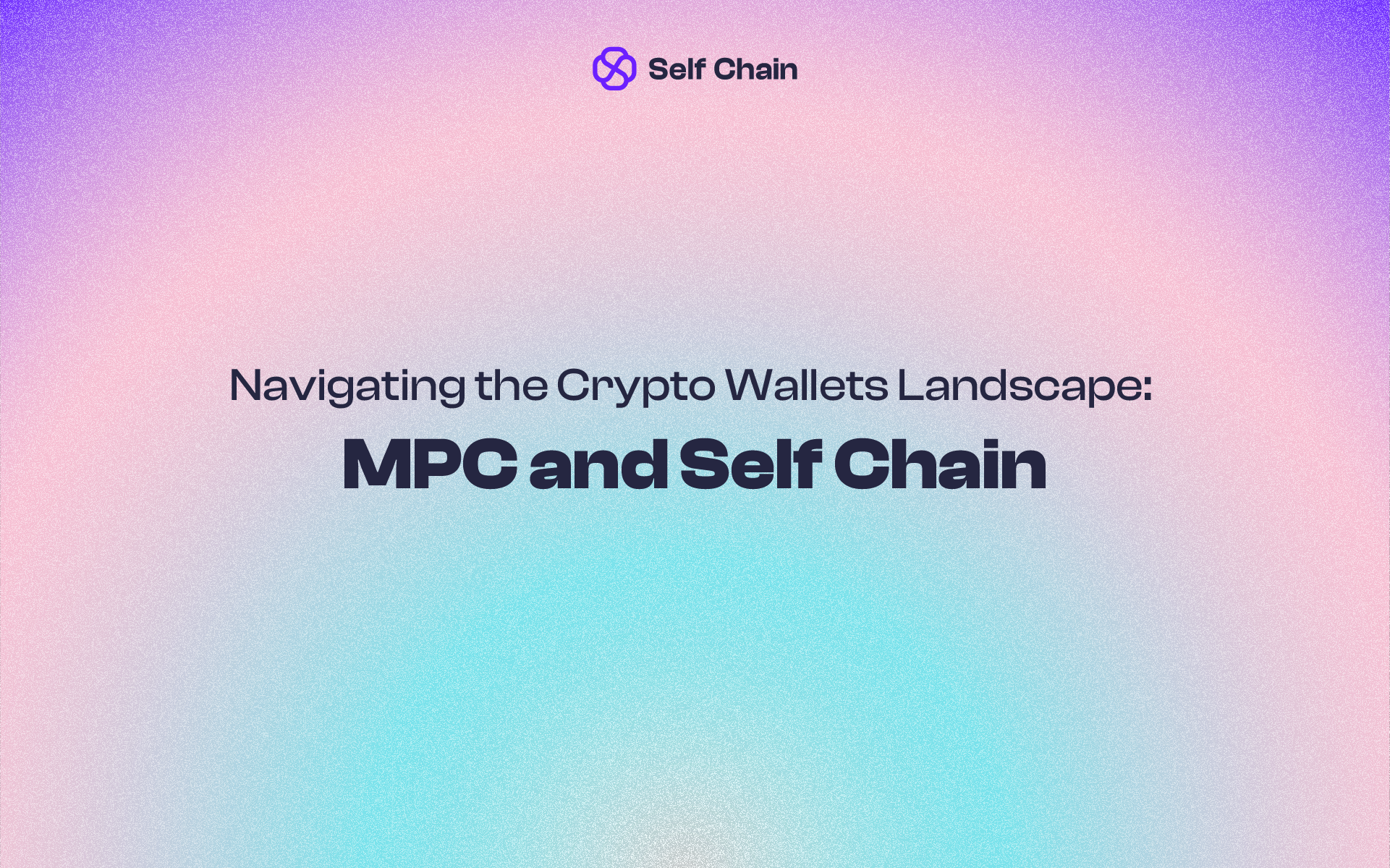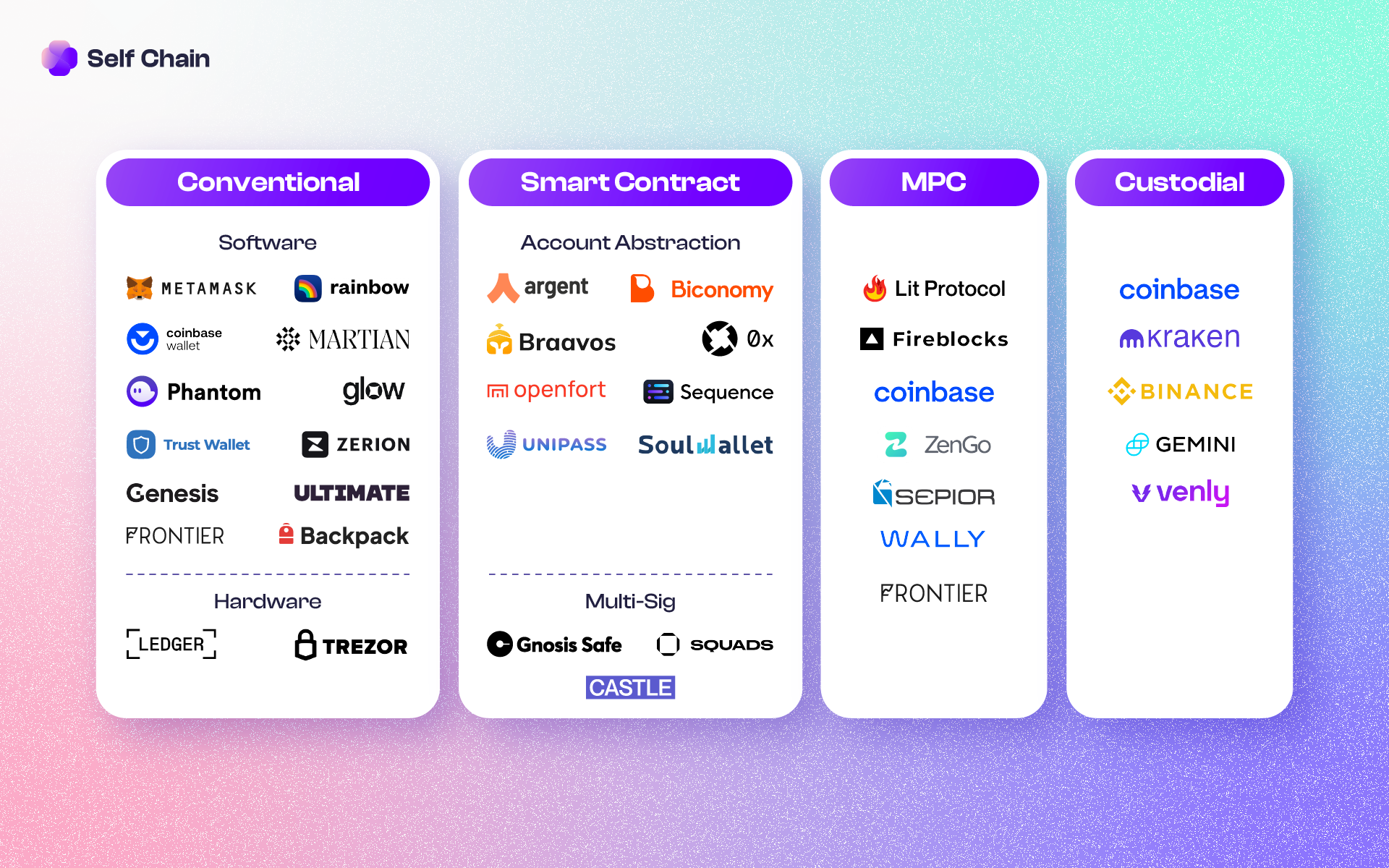Navigating the Crypto Wallets Landscape: MPC and Self Chain
Discover the future of crypto with Self Chain's secure, user-friendly MPC wallet technology.

The web3 world has brought about transformative changes in how we manage digital assets and interact with blockchain-based applications. At the heart of this evolution lies the crypto wallet, a fundamental tool for anyone navigating the decentralized landscape. Understanding the different types of wallets and their unique features is crucial to maintaining control over your assets securely. In this guide, we'll introduce you to various wallet options, explore their advantages and disadvantages, and discover why Self Chain believes that MPC wallets are an ideal choice for the future of crypto asset management.
The Crypto Wallet: Your Gateway to Web3
In the web3 era, crypto wallets have become indispensable companions for anyone dealing with digital assets. These wallets are digital containers that allow users to store, send, and receive cryptocurrencies and interact with decentralized applications (dApps). They come in various forms, each tailored to different needs and preferences, offering a range of features and security levels.
Exploring the Spectrum: Types of Crypto Wallets
Let's embark on a journey through the diverse world of crypto wallets, where each type brings a unique set of advantages and disadvantages:

Browser Extension Wallets:
- Pros: Easy integration with web browsers, making it convenient for daily use. Supported across various platforms.
- Cons: Vulnerable to browser-related vulnerabilities, increasing the risk of phishing attacks if not used cautiously.
- Example: MetaMask is a popular browser extension wallet, that allows seamless integration with Ethereum-based dApps.
Mobile Wallets:
- Pros: Ideal for on-the-go access to cryptocurrencies and dApps. User-friendly interfaces.
- Cons: Potential security risks if the mobile device is compromised. Limited screen space for complex transactions.
- Example: Trust Wallet is a widely used mobile wallet known for its user-friendly interface and broad dApp support.
Hardware Wallets:
- Pros: Unmatched security with private keys stored offline. Protection against online threats.
- Cons: Less convenient for regular transactions. The initial cost associated with purchasing the hardware wallet.
- Example: Ledger and TREZOR are popular hardware wallets trusted for their security features.
Desktop Wallets:
- Pros: Offers control over private keys stored on your local device. Compatible with various dApps.
- Cons: Vulnerable to malware if the computer is compromised. Less mobility compared to mobile options.
- Example: Exodus is a desktop wallet known for its user-friendly interface and multi-coin support.
Paper Wallets:
- Pros: Provides offline storage, ensuring robust security against online hacking.
- Cons: Vulnerable to physical damage or loss. Impractical for frequent transactions.
- Example: WalletGenerator.net allows users to create their own paper wallets for various cryptocurrencies.
Multi-Signature Wallets:
- Pros: Enhanced security with multiple signatories required for transactions. Ideal for shared control.
- Cons: Setup and management can be complex. Potential for disputes among signatories.
- Example: Gnosis Safe is a popular multi-signature wallet, offering advanced security features.
Smart Contract Wallets:
- Pros: Programmable rules for asset management. Recovery options in case of key loss.
- Cons: Setup requires familiarity with smart contract development. Vulnerable to coding errors.
- Example: Argent is a smart contract wallet known for its user-friendly approach to DeFi.
Mobile Hardware Wallets:
- Pros: Melds mobile convenience with hardware-level security. User-friendly mobile apps.
- Cons: Cost of hardware device. Limited device compatibility.
- Example: Trezor Model T combines hardware wallet security with mobile app convenience.
Custodial Wallets:
- Pros: Beginner-friendly. The platform manages funds, reducing the risk of lost keys.
- Cons: Limited control over assets. Vulnerable to exchange insolvency or security breaches.
- Example: Coinbase is a well-known custodial wallet that offers an easy onboarding experience.
Non-Custodial Wallets:
- Pros: Full control over private keys for enhanced security. Ideal for experienced users.
- Cons: Responsibility for key management. Risk of loss if keys are misplaced or forgotten.
- Example: MyEtherWallet (MEW) is a popular non-custodial wallet for Ethereum-based assets.
MPC Wallets (Multi-Party Computation):
- Pros: Enhanced security by distributing secret shares to prevent single points of failure. Suitable for multi-chain wallets. Protection against a single point of failure and seed phrase theft and loss.
- Cons: May introduce complexity in implementation. Integration with some platforms can be challenging.
- Example: Coinbase Wallet, Fireblocks are well-known MPC wallets, offering robust security features.
Self Chain's Vision for MPC Wallets
Among the diverse array of wallet options, Self Chain firmly believes that MPC wallets represent the future of crypto asset management. With a primary focus on enhancing security and reducing vulnerability to theft and loss, MPC wallets are designed to distribute secret shares, eliminating the risks associated with a centralized private key. This feature makes MPC wallets an ideal choice for those who value the security of their assets.
Self Chain plays a pivotal role in this space by building the infrastructure for keyless wallets, further empowering MPC wallets. This keyless wallet infrastructure ensures effortless wallet recovery, resistance to phishing attacks, and complete user control over assets, reinforcing our commitment to fostering a more secure, user-friendly, and innovative crypto wallet experience.
While MPC wallets, like any technology, come with their set of challenges, Self Chain is dedicated to resolving these issues.
Keyless wallets, when integrated with the Self Chain Modular Intent Access Layer, provide users with secure, comprehensive, and user-friendly access to digital assets that cater to a wide range of user needs. This integration offers several key advantages:
- Easy Onboarding: Self Chain's keyless wallets and modular intent access layer simplify the onboarding process for all users, regardless of their technical expertise. This lowers the entry barriers to the Web3 world.
- Effortless Recovery: Users no longer need to manage complex cryptographic keys or seed phrases. Self Chain's keyless wallet infrastructure ensures easy and secure recovery, reducing the risk of asset loss.
- Secure Intent-Centric Self-Custody: Self Chain's approach to self-custody is intent-centric, meaning users can express their intentions clearly and securely. This approach enhances security and control over digital assets.
- Wide Compatibility: Self Chain's keyless wallets are designed to be compatible with various blockchains and protocols, ensuring users can access a diverse range of assets and applications.
- Programmability: The modular intent access layer provides a programmable framework that developers can leverage to create customized solutions, expanding the functionality of keyless wallets.
By leveraging Self Chain's keyless wallets infrastructure and modular intent access layer, users can seamlessly access the Web3 world, enjoying enhanced security, usability, and compatibility for their digital assets and applications.
Furthermore, We are actively simplifying the integration process by offering user-friendly interfaces, developer resources, and a range of powerful tools, including our Software Development Kit (SDK) and pre-built plugins. These tools empower developers to enhance keyless wallets with features like 2FA, Account Abstraction (AA), social recovery, on-ramp, daily limits, multi-sig policies, and more, making MPC wallet adoption accessible and seamless.
In conclusion, the world of crypto wallets is a dynamic and ever-evolving one. Choosing the right wallet depends on your unique needs and priorities, whether it's security, convenience, or specific functionalities. With Self Chain's dedication to the MPC wallet space, we look forward to a future where security and user-centric innovations redefine the crypto wallet landscape.
About Self Chain
Self Chain is the first Modular Intent-Centric Access Layer1 blockchain and keyless wallet infrastructure service using MPC-TSS/AA for multi-chain Web3 access. The innovative system simplifies the user experience with its intent-focused approach, using LLM to interpret user intent and discover the most efficient paths.
Self Chain ensures that onboarding and recovery are effortless with keyless wallets that grant users complete self-custody over their assets. In addition, it provides automated rewards to dApps when they efficiently resolve user intent, further enhancing the user experience. Moreover, Self Chain incorporates Account Abstraction with MPC-TSS to provide secure signing and reduce transaction fees. It's a platform that redefines blockchain interaction, making it more secure and user-friendly for everyone.
In a world where blockchain technology is becoming increasingly essential, the user experience remains a critical factor in its adoption. Intents and Keyless Wallets are set to transform the landscape, making blockchain interactions more accessible, efficient, and secure. As we move forward, the blockchain industry has the opportunity to provide users with a seamless and enjoyable experience, unlocking the full potential of this groundbreaking technology.
